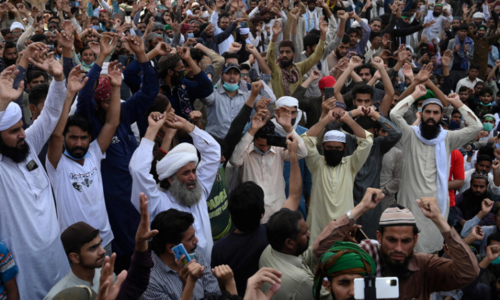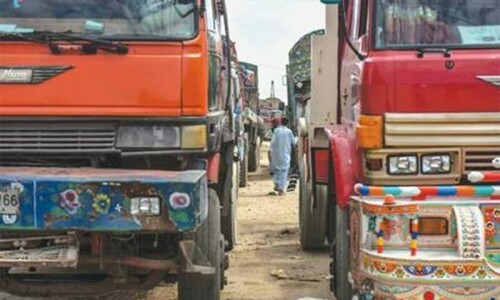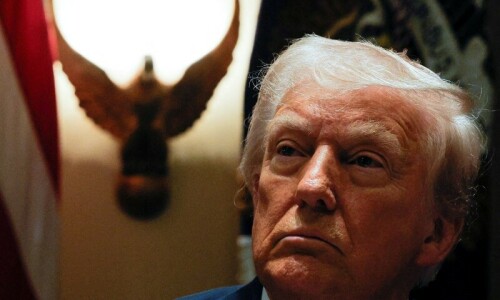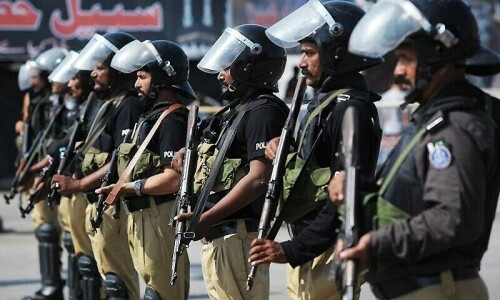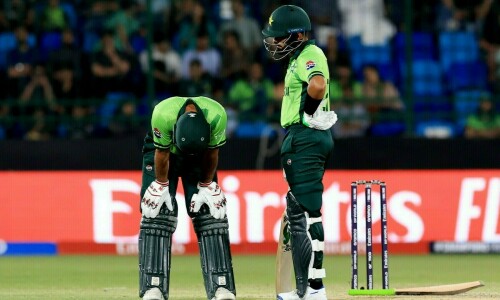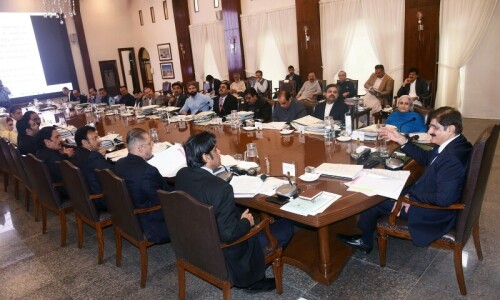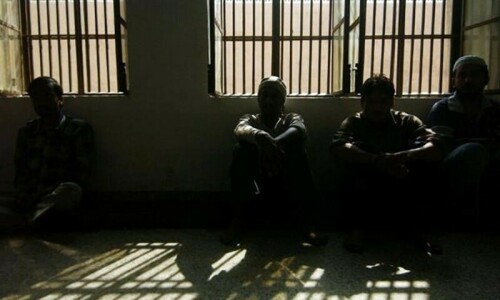• Polling to be held in 39 cantonments today
• Over 100 candidates fielded by four parties each
• Rangers, FC personnel to be deployed outside polling stations
• Fafen to observe the polls for the first time
ISLAMABAD: Over 1,500 candidates will be vying for 206 general seats in as many wards of the country’s 39 cantonment boards on Sunday (today) in the first electoral contest at the grassroots level between arch political rivals since the 2018 general elections.
All leading political parties have fielded their candidates but the main battle is expected among the ruling Pakistan Tehreek-i-Insaf (PTI), Pakistan Muslim League-Nawaz (PML-N) and Pakistan Peoples Party (PPP).
Nationalist and religious parties, including the banned Tehreek-i-Labbaik Pakistan (TLP), are also in the field with a good number of candidates in all the four provinces.
Interestingly, all the parties are participating in the elections without forming any alliance.
There are 219 wards in 42 cantonment boards all over the country, but no polling is scheduled in any of the nine wards of Kamra, Cherat and Murree Gallies cantonments where either the candidates have been elected unopposed or polling has been postponed. Besides, there will be no elections in four other wards of various cantonment boards where candidates have already returned unopposed.
The Election Commission of Pakistan (ECP) on Saturday announced that it had completed all the necessary arrangements for the elections in the cantonments where polling will be held between 8am and 5pm without any break.
Earlier this month, the PTI had asked the ECP to deploy troops inside and outside the polling stations for maintaining ‘law and order’ and ‘ensuring transparency’ in the elections, but the proposal was rejected by the ECP, which has sought the deployment of the Rangers and Frontier Constabulary (FC) outside the limits of the polling stations. The ECP had directed the provincial governments to install CCTV cameras at the ‘highly sensitive polling stations’. Voters will not be allowed to carry their cell phones inside the polling stations.
The ECP has also issued separate codes conduct for the personnel of law enforcement agencies, independent election observers and media persons for the polling day.
A total of 1,513 candidates are contesting the polls to win general member seats in 206 wards of the cantonment boards. There are 878 candidates in 112 wards of 19 cantonments in Punjab; 418 in 53 wards of eight cantonments in Sindh; 170 candidates in 33 wards of nine cantonments in Khyber Pakhtunkhwa (KP) and 47 candidates are in the field in eight wards of three cantonments in Balochistan.
The PTI has fielded the highest number of 178 candidates in all the four provinces, followed by the PML-N and the PPP, which are in the electoral race with 140 and 112 candidates, respectively.
The PML-N, however, has not nominated any candidate in Balochistan.
Jamaat-i-Islami (JI) is at number four with 105 candidates contesting the elections in the four provinces. Of its 105 candidates, 50 are in the run in the Punjab only.
The urban Sindh-based Muttahida Qaumi Movement (MQM) and Pak Sarzameen Party (PSP) have also fielded 41 and 33 candidates, respectively, in the cantonment boards located in Karachi and Hyderabad.
The TLP, which was banned by the government under the Anti-Terrorism Act some five months back, has surprised many by fielding 84 candidates in 17 cantonments in three provinces. A careful analysis of the list of candidates of all the 206 wards shows that the ultra rightwing TLP has fielded three candidates in two of the nine cantonments in KP province, 24 in six of the eight cantonments in Sindh and 57 candidates in nine of the 19 cantonments in the Punjab.

According to federal Minister for Information Fawad Chaudhry, the TLP is contesting the elections because the Punjab government has not yet moved the case to the Supreme Court for delisting of the TLP as a political party as required under the law. He had disclosed that the Punjab cabinet had also declared the TLP as a banned organisation.
The government had slapped the ban on the TLP under the Anti-Terrorism Act on April 15 after three days of countrywide violent protests by its activists after the arrest of their leader Saad Rizvi in Lahore. The protest call had been given by the TLP leadership over what it claimed government’s failure to implement an agreement with the party, which had demanded that the matter of French ambassador’s expulsion from Pakistan over the blasphemy issue be referred to the parliament.
Because of one-on-one contests, interesting results are expected in various wards of cantonments, mostly in the Punjab.
The data shows that the highest number of 155 candidates are in the field in 10 wards of Walton Cantonment, followed by 112 candidates and 95 candidates in Lahore and Gujranwala cantonments, respectively.
In Sindh, as many as 98 and 88 candidates are contesting in Clifton and Faisal cantonments, respectively, while 73 candidates are in the run for Hyderabad cantonment board election.
In KP, there are 53 candidates in 10 wards of Abbottabad whereas 35 candidates are vying for five general seats in Quetta cantonment in Balochistan.
2.1m voters registered
In all the 42 cantonments, 2,197,441 voters (1,154,551 men and 1,043,190 women) are registered. According to the ECP, 5,080 polling booths will be set up in 1,644 polling stations.
The Free and Fair Election Network (Fafen) is also monitoring the cantonment board elections for the first time with the deployment of 74 male and 46 female observers. According to an official announcement by Fafen, these 120 observers will monitor the voting and counting processes at around 460 polling stations, almost 30 per cent of total polling stations. Fafen will release its observation report on September 15 to media and other stakeholders.
The cantonment board elections are the fifth major electoral exercise the nation is witnessing this year amid coronavirus pandemic. In February, by-elections were held on seven national and provincial assemblies seats. The same month elections in Gilgit-Baltistan were conducted, followed by the Senate polls in March though they were not direct elections, whereas people of Azad Jammu and Kashmir elected their representatives in July.
The cantonments where elections are being held are Rawalpindi, Chaklala, Wah, Taxila, Murree, Attock, Sanjwal, Jhelum, Mangla, Sargodha, Shorkot, Gujranwala, Kharian, Sialkot, Lahore, Walton, Okara, Multan and Bahawalpur (Punjab); Hyderabad, Karachi, Clifton, Malir, Faisal, Korangi Creek, Manora and Panno Aqil (Sindh); Peshawar, Risalpur, Nowshera, Mardan, Kohat, Bannu, D.I. Khan, Abbottabad and Havelian (KP); and Quetta, Zhob and Loralai (Balochistan).
Published in Dawn, September 12th, 2021



